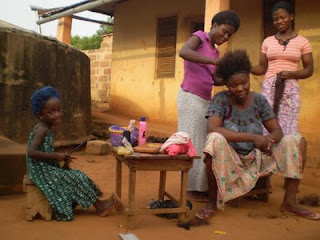
17 December
Surrounded by sweating hordes of people sweeping me along up the hill, I considered carefully before attempting what could be a very dangerous manoeuvre: pausing to take a picture. An opportunity presented itself: two cars parked in the middles of the road, ten inches separating the bumpers. I would come to the space in 5, 4, 3, 2, 1 step—woosh—I slipped between the cars and the small space I’d occupied in the mob was quickly swallowed. I took advantage of the space to clear my nostrils a bit, falsely assuming that it was everyone else who smelled slightly rancid and not me. But no, I blended in perfectly. A 5km bike ride midday in a nice complet and 30 minutes shuffling along a dirty, muddy, overcrowded path can make anyone smell native.
I aimed carefully at the vendor on the side of the churning river of people. I focused on his wares – wacky plastic Jesus figurines, glow-in-the-dark crosses, pastel pink-cheeked cartoonish images of Mary, etc. – and *click* successfully got a beautifully fuzzy picture of someone’s sweaty backside. Hmm. Maybe standing between the crowd and the subject of my photo wasn’t such a good idea. I contented myself with a couple snaps of the flow working against gravity, struggling up the muddy hill on their yearly pilgrimage to the Sanctuary of Our Lady of the Seven Sorrows.
Every year, on the first weekend of December, thousands of Catholics come to Kovie, the town right next to Mission Tove – it’s close enough to be considered part of my work area. Teachers discussing it at the lycee told stories about seeing apparitions of the Virgin in the sky. (Unfortunately this story lost both credibility and coherence being recounted by a rather drunk Monsieur M.) Normally this festival is considered the beginning of Harmattan in Mission Tove. Harmattan is the wind that come down from the Sahara, carrying huge dustclouds along with it. The dust is so intense that the temperature drops into the 60s (very cold by local standards).
This year, though, we have not yet seen huge dustclouds or a drop in temperature – in fact it’s been oppressively sunny and hot, making me fearful about the “real” hot season that’s supposed to come in January. On 5 December, the Friday before my trip up the hill with the pilgrims, the skies opened and poured down rain for 10 hours. All the roads were churned up, every car or moto leaving deep tire treads in the earth.
Did I mention the thousands of pilgrims to the shrine the weekend of 5 December? The roads were a mess. Especially the road leading from Kovie up to the shrine. When one runs a finger across the path of a line of ants, they seem to lose their way, swarming around the lost trail, confused by the strange smells and oils left by the finger. They slow down and spread out, wandering but usually are able to take up the trail again eventually and resume their energetic business.
At the lowest point between the two hills the swarm of pilgrims was thwarted by the strange and goopy finger of God (aka a rain-flooded stream). With careful steps, helping hands, and great patience everyone eventually got across after much milling about like the aforementioned ants). Even those in cars and on motos, although they were much cursed by pedestrians. We crossed, we climbed, we reached the summit and then we camped. Well, I didn’t camp, but everyone else did. There was an amazing diversity of set-up: fully-equipped tents will small generators for charging the laptops warming the laps of young men in suits, families sleeping around a cooler full of soda and brochette sandwiches on a few pagnes laid out on plastic mats, some families even constructed mini-houses out of palm fronds to keep them away from the sun.
When I reached the top, someone was calling out the rosary over a loudspeaker – first in Ewe, then in French. It was interesting to hear prayers that I know so well being spoken in other languages. I could feel the same insistent rhythms but couldn’t join in even if I’d wanted to.
It was rather alienating actually; being in the presence of something so familier and yet so different. I have voluntarily distanced myself from Catholicism, but it’s still a very potent part of my heritage and my self-understanding. 10 year of Catholic school certainly encourages that. I ended up feeling rather overwhelmed and lonely and left after only about an hour on top of the hill. I hung around the vendors a bit, bought a few souvenirs and chatted to the women and children, showing off my small Ewe knowledge. I felt a bit better outside and recovered my sense of self and community as I re-entered Mission Tove where kids and adults alike yell excitedly when they see me – ‘Da Adzo Da Adzo!’
I will never be perfectly integrated here, but I have a role and a job in this community. And it’s hard not to feel happy when I’m greeted with such squeals of delight.









